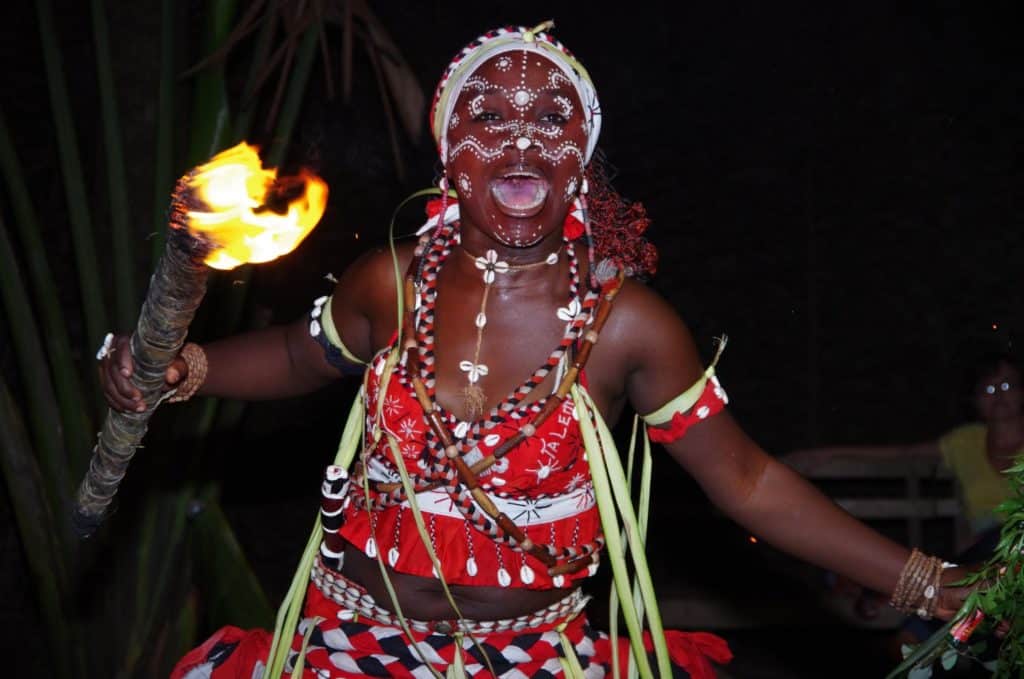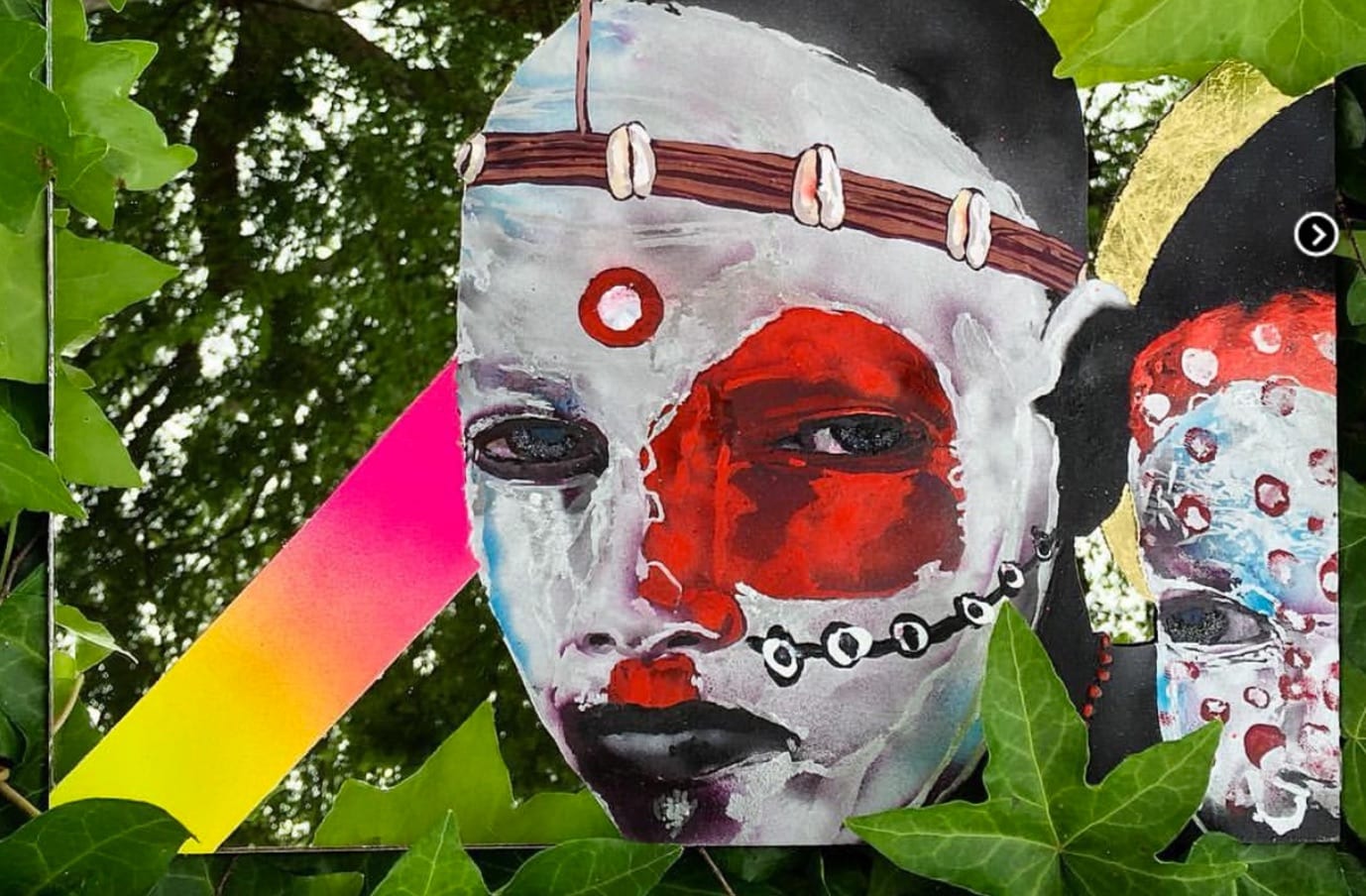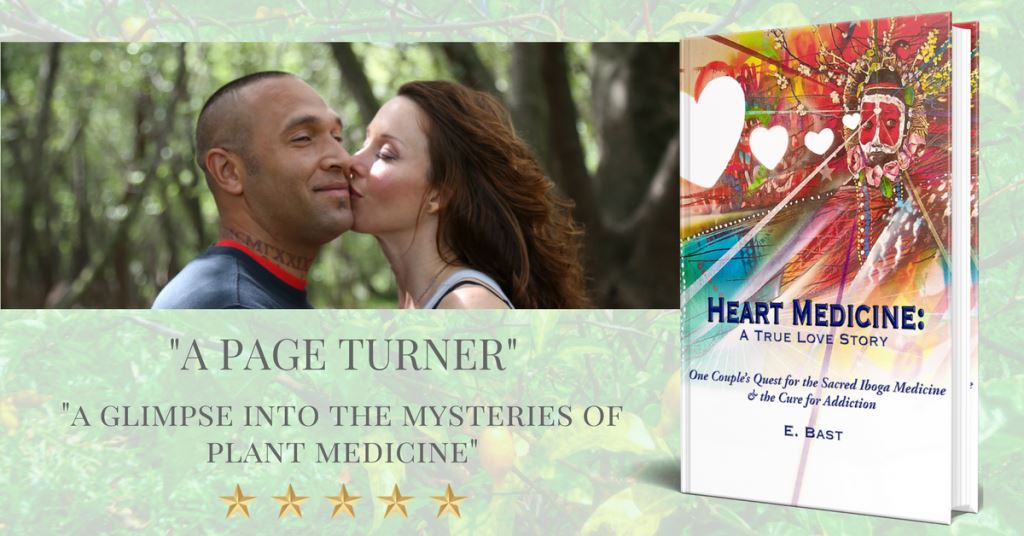Iboga Medicine – Psychedelic Healing the Bwiti Way

Iboga is one of the most psychedelic plant medicines in the world, and can can refer to many plants in the Apocynaceae family of perennial rainforest shrubs with psychoactive properties, including Tabernanthe iboga, Tabernanthe manii, and Voacanga africana. Iboga stimulates the central nervous system when taken in small doses and induces visions in larger doses.
In the parts of Africa where iboga grows, the bark of the root is chewed for both medicinal and spiritual purposes. One of the oldest known plant medicines in the world, iboga has centuries of traditional use by various cultures in central Africa, such as the Bwiti people of Gabon.
The Bwiti consume smaller quantities of iboga – 1 or 2 spoons – to fight muscle exhaustion during long hunting expeditions or canoeing trips, much like an espresso shot. Medium-size doses are used during healing rituals to cure everything from back pain to fever. They consume a huge, visionary dose of iboga during initiation ceremonies, where initiates will spend the first 2 weeks performing rituals, gathering medicine in the forest, and undergoing confessional sessions in smoke-filled tents.
Finally, on the initiation night, the person who is about to be initiated is invited into the temple, a long rectangular hut flanked with wooden benches and presided by an altar. They are then covered in white powdery clay and asked to swallow the bitter iboga chips. They are surrounded by people who have already been initiated, who look after them, singing and dancing around a fire until well after sunrise.
During that initiatory experience, the initiates enter the spirit world, commune with their ancestors, and receive guidance for their lives.
LISTEN Kicking Heroin Addiction with the Ultimate Ancestral Trip | Elizabeth Bast & Chor Boogie

Art by Chor Boogie
How the Bwiti Discovered Iboga
The original story passed down through many generations starts with a man who brought home a porcupine from a hunting trap. His wife prepared the game for their evening meal. After eating the porcupine, the wife found herself in a shamanic journey where she discovered her origins and her true spiritual nature. Upon sharing this experience with her husband, they returned to the place that he laid down the trap to find out what could have caused this mystical experience to occur. They discovered that the porcupine had been eating a root from a tree that grew in the jungle. They took this root back to the village and shared it with the rest of their tribe.
The entire tribe received profound healing and insight from the sacred wood. When the tribe communed with the medicine, it told them what plants in the jungle to use to cure certain disease, parasites, and ailments. The sacred wood became a rite of passage in a Bwiti tradition, so that when a young person comes of age, they receive an initiation with iboga medicine.
How the Bwiti Use Iboga Medicine
The Bwiti religion is the largest practicing religion in Gabon; the sacramental use of iboga is one of the core practices of this spiritual tradition. Iboga healing ceremonies are performed as initiation rites, for reasons of spiritual or personal development, or to cure serious mental or psychosomatic diseases. During these ceremonies, a large amount of medicine is consumed in order to evoke a near-death experience. When consuming iboga for spiritual purposes, the aim is to discover one’s own inner wisdom, rather than to follow a particular dogma; the Bwitis’ only guideline for this ritual is that you endeavor to find the answers you seek within yourself.
Some Bwiti tribes use iboga for celebrations that involve dancing around the fire using elaborate torches made with a special resin that is similar to frankincense. The Bwiti also craft musical instruments guided by the spirit of iboga. The first instrument in recorded history created by the Bwiti is known as the Mougonga or mouth harp, which has a very distinctive sound and wide range of tones.
The music played during iboga ceremonies, much like icaros in ayahuasca tradition, has a very specific effect on the body and is oriented towards balancing the right and left hemispheres of the brain through a series of polyrhythms. A study done by iboga researcher Süster Strubelt suggests that the music played during the iboga ceremony has direct somatic influences on the participants’ healing experience.
Not only the absolutely consistent basic meter and the incessant use of polyrhythms, but also the harmonic organization and the choice of instruments in all probability serve to activate the cerebellum and generate theta-frequencies in the EEG.
Why Are More Westerners Seeking Iboga?
In recent years, increasing numbers of Westerners have been seeking out iboga medicine, for spiritual reasons, as well as for healing. Part of the increase in interest stems from psychedelic tourism. Iboga is multiples more psychedelic than ayahuasca or peyote, because it contains at least 12 psychoactive substances rather than just 1 or 2… and adventurous tourists to Gabon are intrigued.
More importantly, iboga has been found to be highly effective in treating one of the most devastating epidemics in the Western world – opioid addiction.
Iboga started to grow in popularity in the Western world when it was discovered that ibogaine – one of the primary active alkaloids in the iboga plant – was extremely effective in treating drug addiction. Since this discovery, ibogaine rehab clinics have begun to pop up wherever the drug is legal, from Costa Rica to Canada.
Even though it may be more efficient to treat addiction with ibogaine in a clinical setting, there is a strong argument for having a full, traditional iboga experience. The Bwiti, like many indigenous cultures, believe that the root of all illness is spiritual, so in order to completely heal the body, one must first heal the soul. In order to heal the soul, you must prepare to enter the spirit world, seek guidance from your ancestors and discover the answers that lie within yourself.
Furthermore, a traditional iboga initiation is a community ritual. Not only do you have the support of your tribe as you embark on that profound healing journey…there is something deeply empowering about meeting your ancestors during a 24 hour trip, and discovering that they totally have your back.


Hello,
this blog is really good and helpful iboga is very useful for medical therapy thanks for sharing this blog.